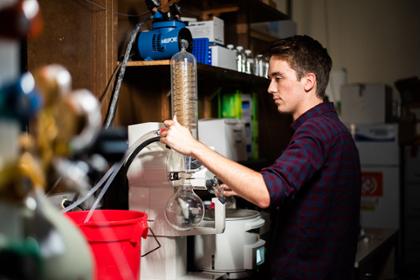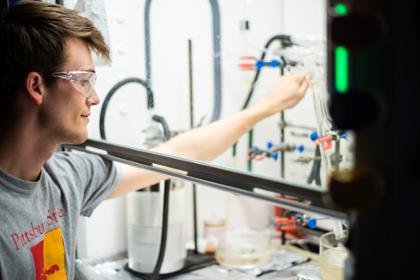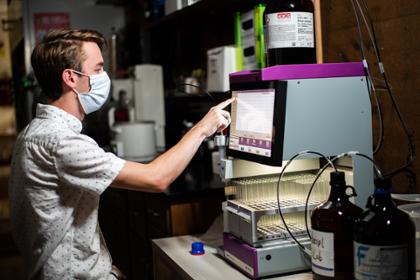And his twin brothers Adam and Caleb, a biochemistry major and a cellular and molecular biology major, are part of his team.
The Worsley brothers grew up in Pittsburg, attending George Nettels Elementary School, Pittsburg Community Middle School, and Pittsburg High School, where all three were active in tennis, in HOSA (Health Occupations Student Association) and excelled academically.
Paul was inspired by high school teacher Jim Foresman (BSEd '86, MS '93).
“I took all three of his health science courses,” he said, “and went on to qualify for nationals in medical math twice.”
Adam and Caleb were inspired by high school teachers Stuart Perez (BSEd '99) and Sally Ricker; they, too, took health science classes and enjoyed them.
These days, you'll find the Worsley brothers in a lab on the first floor of Heckert-Wells at Pittsburg State, home to the Chemistry and Biology departments, where they’re completing tedious and methodical steps in hopes of using biocompatible polymers as drug delivery systems.

Seven years ago, Paul’s mentor, Associate Professor Santimukul Santra, began conducting research there on the use of polymeric and iron oxide nanotheranostics as a way to deliver life-saving anti-cancer drugs throughout a patients’ body.
“We’re taking monomers — something you can buy — then modify them and connect them,” Paul explained as he and his brothers got to work one afternoon in the lab. “They are small molecules that contain carbon and oxygen that when they bond together they form polymers. Polymers are what we want.”

Inside each polymer, they can put a cancer therapy drug that can kill cancer cells. On the outside, they can put receptor targeting molecules to which cancer cells will connect.
“We’re creating a vehicle, a very teeny-tiny particle, known as nanoparticle or nanomedicine,” Paul said, “and we’re trying to develop the best one possible. We want it water dispersible so it will be easier to absorb.”
The brothers must complete all synthetic steps in a fume hood and a valuable, complicated piece of machinery called a CombiFlash NextGen 300+ to purify all the functional monomers.
A grant from K-INBRE — the Kansas Institutional Development Award Network of Biomedical Research Excellence — is helping to fund the expensive piece of equipment.

“Say we want to make the final Monomer No. 3,” Worsley explained. “We buy Monomer No. 1. We chemically modify it a little bit with a reaction to get Monomer No 2. After this, we can’t go straight to Monomer No. 3, because some of Monomer No. 1 is left over. We purify Monomer No. 2 (therefore removing unreacted Monomer No. 1) to make sure the next reaction will result in Monomer No. 3 and not have any side reactions.”
“It’s like evolution, and we get a different generation each time,” he said.
And when each functional monomers and polymer are complete, they analyze it with Santra.
“How can we make it better? What techniques do we refine?” Paul said.
Soon, they’ll do cancer cell culturing to test the synthesized nanomedicines.
“We’ll actually grow various cancer cells,” Caleb said. “There are live ones upstairs in the Biology Department, frozen in liquid nitrogen. We’ll grow them. Then, we put the chemotherapy drug in the polymer as a result of nanoformulation and test it.”
With time and patience, by January the brothers hope to have results they’ll be proud to share at a prestigious statewide health science conference under the direction of K-INBRE.
K-INBRE is designed to inspire undergraduate researchers to pursue careers in biomedical research; the Worsley brothers’ are among 14 students at Pittsburg State to be named K-INBRE Student Scholars.
Learn more: